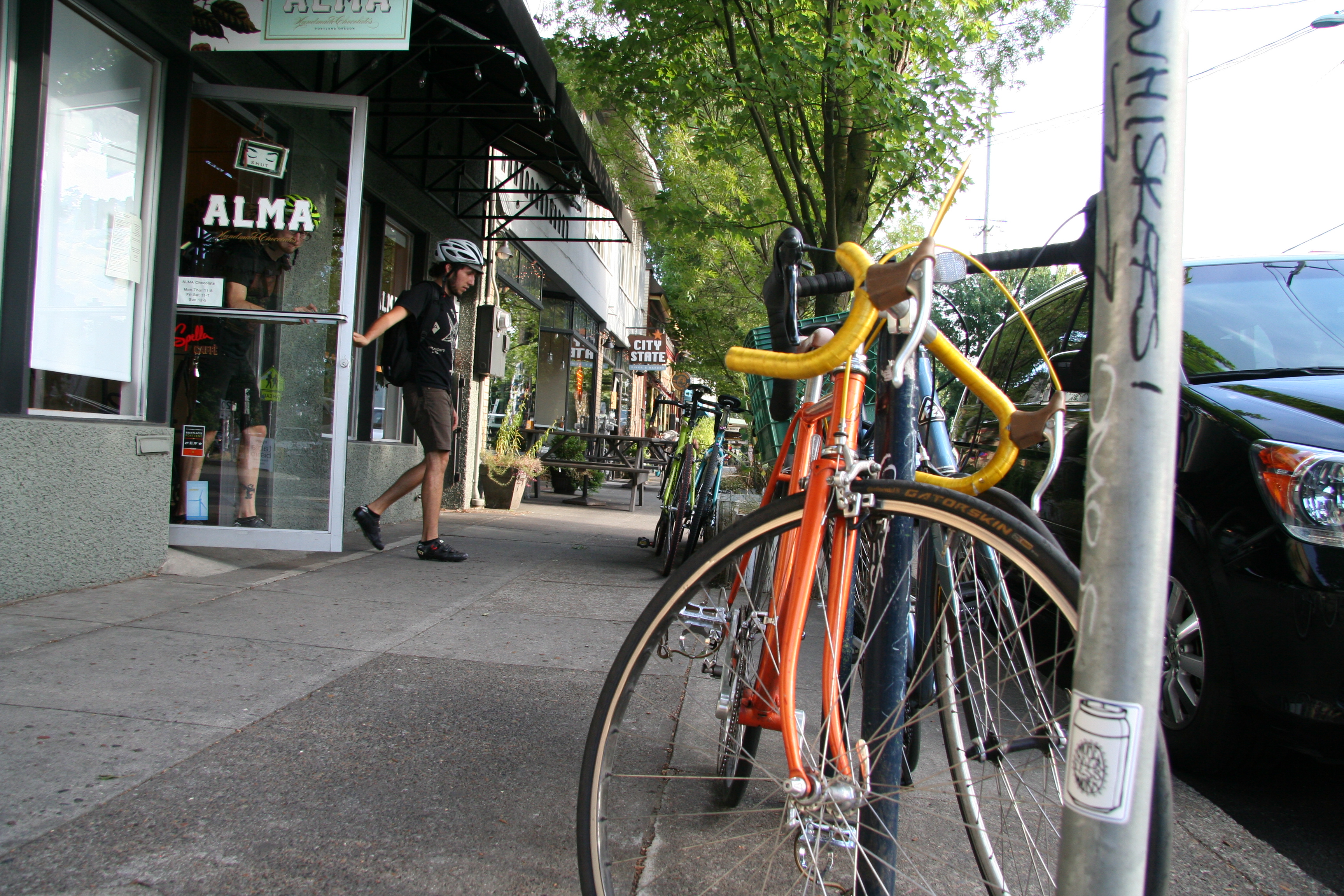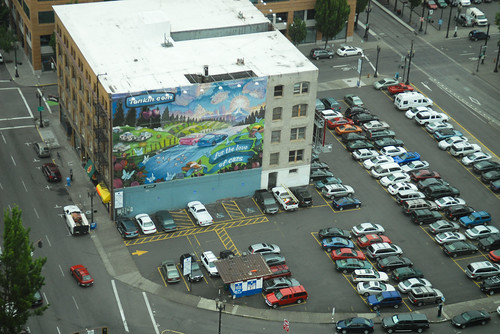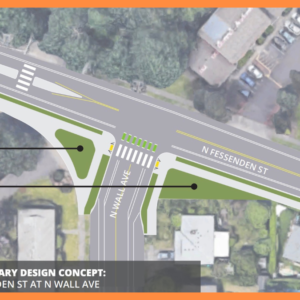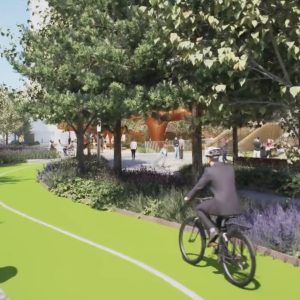It looks like Portland is finally ready to think long-term about its auto parking policies.
The City of Portland is preparing to embark on an 18-month study of its future auto parking needs, thanks to a $225,000 state grant. The result of the work, which the city said seems to be the first project of its kind in the country, could shape residential and commercial development patterns and on-street parking policy in the city for decades to come.
And for people who care about fixing Portland’s chronic shortage of low-car-friendly housing, or who those who want the city to reduce the tax-funded handout of so much free auto parking, the tea leaves look good.
“We, as a City, need to decide what parking access and convenience level we find acceptable given our other city goals (mode split goals, air quality, housing affordability, etc.).”
— City of Portland grant application
The idea of the study is to force the city to ask itself, “Given what we say we want this area to develop into, what will parking look like then?” said Sara Schooley, parking policy analyst for the Portland Bureau of Transportatation.
To that end, the project will study the current auto parking needs of five different “corridors” and five different “centers,” which Schooley said will be scattered throughout the city.
Then Schooley and her colleagues will estimate how much or how little space should be available for parking for the city to develop that area as it wants to — and compile a list of policy options to make that work; such as whether paid parking permits, meters, or better bike, foot and transit access are needed.
“We, as a City, need to decide what parking access and convenience level we find acceptable given our other city goals (mode split goals, air quality, housing affordability, etc.),” the city wrote in its grant application (PDF).
That’s a smart take. It’s true that Portland streets are getting more crowded and annoying to park in. But it’s just as true that in a city where 25 percent of renters already get by without a car, mandatory auto parking rules drive up housing costs and make dense, walkable development illegal.

(Photo by M.Andersen/BikePortland)
Here are some other relevant passages from the city’s grant proposal, emphases mine:
Building parking is an expensive venture and, if built excessively, can burden both the developer and future residents or customers. When parking is built, the costs of building and maintaining the space or garage is passed to the user, thus increasing the costs of rent. This increase in costs can lead to residents and businesses being “priced out” of an area; given the concentration of services in Portland’s centers and corridors, these are exactly the areas where those who are at risk of being “priced out” should be living to increase their access to housing types, services, transit, and community.
“A successful parking environment will not have an oversupply of parking and instead look to create a supply based on actual and future demand.”
— City of Portland
When looking at parking and potentially planning parking requirements and infrastructure for the future, it is important to provide access to transportation options so that residents can live the low‐car lifestyles that the City looks to encourage. The parking policy toolkit will also offer recommendations of how active transportation should complement parking strategies to create access into and out of the centers and corridors, as well as support the economic growth of each center and corridor.
Even while Portland aims to reduce VMT, driving remains the most used form of transportation in the City. Therefore, driving (and its associated parking) is integral to the economic success of the City and region. That said, a successful parking environment will not have an oversupply of parking and instead look to create a supply based on actual and future demand. The aim of this project will be to set guidelines to determine what adequate supply for the future looks like as transportation patterns change.
Like every project of this size, the devil will be in details such as the precise meaning of “adequate.” But reading the way the city has framed its big goals here made me want to start handing out halos.
The Real Estate Beat is a weekly column. Read past installments here. We are looking for a sponsorship partner. If interested, please call Jonathan at (503) 706-8804.









Thanks for reading.
BikePortland has served this community with independent community journalism since 2005. We rely on subscriptions from readers like you to survive. Your financial support is vital in keeping this valuable resource alive and well.
Please subscribe today to strengthen and expand our work.
I was in Portland last month, looking very specifically at transportation issues. It struck me that many parts of Portland–especially downtown and Lloyd Center–have as many parking structures and/or parking lots as the more congested areas in my own Los Angeles.
Creating rental units without any provisioned parking does not mean that car-free tenants will flock to live there. It means your average renter will occupy the apartment, and put further strain on the on-street parking of the neighborhood. NW Portland has plenty of old apartment buildings without any provisioned parking. How’s the parking situation there?
Again proving that the automobile is the problem, not people without them.
The answer to this is simple. Make vehicle registration contingent on proof of a place to store said vehicle when not in use, a la Tokyo.
Otherwise, we already have neighborhood parking zones, which require proof of residency to acquire. Simply make residents of parking free buildings ineligible to purchase neighborhood parking permits.
the idea that people with a home loan or who own their home outright should have greater access to a public parking facilities is pure bias. the simplest solution to scarcity is to increase fees for everyone until supply is roughly equal to demand. home/loan owners who do not like this can build a garage or driveway on “their” private property.
Good point. I didn’t mean to suggest that homeowners and renters have different rights from a city services standpoint, as each occupant is paying the same taxes and fees either directly, or indirectly through their rent.
So maybe we should (as you say) to extend permitted parking zones into every neighborhood, limit on street parking to two hours (or whatever arbitrary number) and charge accordingly for the zone permits. We already have a system in place for doing this.
If you give something away for free, or under-price it, it will be consumed. The problem is underpriced street parking. When it costs a developer $20k+ to add a garage parking spot and they see a bunch of cars parked on the street for free, they are going to want to add as few as possible.
Bingo.
And do they have problems renting apartments in Northwest Portland? No? Then I guess they don’t have a problem with parking, at least not a problem that’s bad enough that people don’t want to live there. I think even the businesses are doing okay. But, there sure is a lot of complaining.
Do they take into account that central Portland, both east and west, is a 19th century city and you won’t really increase the room to use cars unless you tear it down and rebuild it as a replica of Clackamas County? Are they asking how usable a private car will be inside of Portland city limits if there are 20% more of them on the road? You don’t get a junkie to clean up by transplanting bigger veins into their arms.
I hope the city makes a clear distinction between on street parking and parking overall. Clearly private storage of cars in public spaces is a huge barrier to better cycling everywhere. Parking minimums or maximums on private property seems like a much lesser barrier.
Public parking is cheaper and more abundant in central Portland than in any other dense city I’ve ever been in. There’s something to be said about that too.
The city’s approach, as explained at a Buckman NA meeting tonight, is to manage on-street parking to make use of the “resource”. Permits were mentioned as a way to do this.
As has been pointed out in this venue, requiring parking onsite wastes valuable inner city land, raises the cost of housing, and ensures that there will be fewer people within biking or walking distance of stores. This leads the stores to want bigger parking lots because most of their customers drive. This leads to more auto traffic, making things bad for cyclists. All this should be weighed in asking for less cars parked on the street (at least local neighborhood streets).
Doug, there is zero proof that the cost savings on parking are passed on to tenants. Zip. Zero. Nada. Landlords are gouging millenials, period.
Actually, there is. Check out the research on parking influencing housing prices – I saw a pretty convincing study out of San Francisco about a decade ago. I know for a fact, as a renter, that I paid more for housing that included parking. When parking is at a premium, you pay for it. This is evident in every city I’ve lived in.
Mamacita, I’d advise doing some Google research. I googled “Impact of parking on rent” and the second hit seemed to have evidence that increased parking requirements increase rent:
http://www.vtpi.org/park-hou.pdf
Look at the bottom of p. 13 (bottom-of-page page numbers, not PDF page numbers) for this:
“Developers’ most common response to the high incremental costs of increased parking is
to stop building affordable urban housing. One case study from the early 1960’s found
that requiring one off-street parking space per unit reduced dwelling units per acre in new
multi-family developments by 30%, and increased construction costs by 18% (Smith,
1964). This significantly reduced the amount of urban land available for infill housing
and gave developers an incentive to develop fewer, larger and lower quality units. The
resulting reduction in affordable housing construction increased local rents (Shoup, 2005
contains more examples of parking requirement cost impacts). “
If off-street parking is plentiful along a commercial corridor, on-street parking lanes should be converted to buffered bike lanes. This study should help define what amount of off-street parking is sufficient to trigger the conversion, and lead to land use policies that identify what needs to change for our city to look the way we want it to. One devilish detail this study might not address (many don’t) is measurable outcomes.
I think the ” parking sprawl lots are crazy ” has anyone had a car dart out on them when on a bike.. I say limit auto traffic in the city and watch it grow more, not just money for parking fees.
Parking lots and structures are blight and need to be reduced and that land put to productive purposes. Downtown and lots of commercial strips look bombed out; my German wife once said it looks like we lost the war! No one should be forced to pay for parking they don’t need; all parking should have a price for those who use it.
She’s not the first one to make that comparison
http://theoverheadwire.blogspot.com/2010/02/parking-bombs.html
Parking is “not productive?” We built the streetcar with parking revenue bonds. We renovated civic stadium for the timbers with parking money. Parking is a major source of pbot’s discretionary funding. The goodman family fortune is built on parking money. It seems to be quite productive.
It is lucrative. Useful, too, if you’ve got a car you want to ditch. But productive, I’d say not so much.
Over here in Washington DC, we are having that conversation and the planners seem interested in reducing the number of parking spots
Just for curiosity’s sake- Look at Sydney Australia where it is $7/hr for on street parking and $175/day at the parking garage.
Sara Schooley, I’m curious whether the study will attempt to make use of forcasting–or goal-setting–for the long-term future impact on parking demand that results from the growing car-sharing movement, and the attendant reduction in single-car ownership.
I know that it’s early the game for service models like Getaround, Car2Go, and the big corps jumping on board like U-Haul and Enterprise, etc.–although Zipcar (Flexcar) has a well-established history in this town–but I think it would be worthwhile to put car-sharing on the list of considerations, no matter how small it might look.
I’m curious too. In our lifetimes we’ll be left with hardly any cars in use.* Are you including the end of casual fossil fuel combustion in your study?
*it’s anyone’s guess as to what we’ll do with all of them once we discover we can’t afford to use them
I love the irony of PBOT having to get a grant to study parking. If they can not afford a quarter million dollar parking study, then we are not charging enough for parking.
PBOT does not control the price of parking in Portland, City Council does. The last PBOT director to suggest PBOT be given control of pricing parking no longer works here.
That may be true, but is totally besides the point. I was shocked 15 years ago when I moved here from the mid-west at how cheap and easy it was to park downtown…or anywhere for that matter…..At the same time I got rid of my car within a year as it was unneeded.
Since then the per hour rate increases have not even kept up with inflation (except for the congestion pricing during game days) and the only added meters have been in Lloyd district and soon in NW after a generation long battle. Until we get over our assumption that businesses need free parking to do well, PBOT will not have stable funding.
I thought graffiti was supposed to be promptly removed. Whats with the uber ugly NWO defacement of that space?
its a total car ad… lol
San Francisco has already done a pretty comprehensive study of its public parking. I don’t know whether PBOT has any grounds for the claim that this study is the first of its kind, unless they mean the first parking study that’s not comprehensive but covers both public and private parking. Which isn’t much of a milestone.
It’s not the comprehensiveness of existing parking but the tying of long-term parking planning to desired land uses. Here’s the relevant paragraph from the city’s grant application:
“In preliminary research, City staff has found no examples of other cities that are actively planning or creating a parking toolkit for the development indicated within their Comprehensive Plan or long-range planning processes. While a handful of cities across the country have ‘Strategic Parking Plans,’ few detail how new development (and associated standards) impact mode shifts, and meet other city objectives. We expect this toolkit to be invaluable for transportation and planning professionals in Portland, as well as a valued regional and national resource.”
I would love to see more of the surface parking lots in downtown be developed.
We pay for food and water, we pay for shelter and health care. It seems to me that paying for things is a decent way to divy up a limited resource. And we all seem mostly comfortable using that mechanism when it comes to those vital things. So what about when it comes to a non-vital resource, like parking? It stands to reason that if we’re willing to pay for vital things as a way to divide them up in way that approximates fair then at the very least, we should also divide up non-vital resources according to the same basic mechanism.
A study to examine just how much parking we should have in the city to accommodate those willing to pay market prices for it sounds like a grand idea and I hope it pays dividends.
Maybe it’s supposed to be ironic?
No no, we must keep every last surface lot downtown. Where else will all the entrepreneurial food cart operate?
Rooftop Food Carts™, or RFCs. Heard it here first!
BTW, that photo was from a story I wrote back in 2010: Portland and parking lots: For the love of cars
The parking lot in lead photo is the site of the historic Labbe block and building built in 1880 and demolished in 1933 during the Depression. How truly depressing that the site remains a parking lot today. ;(